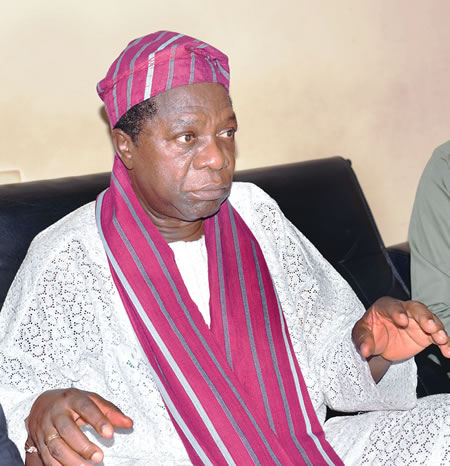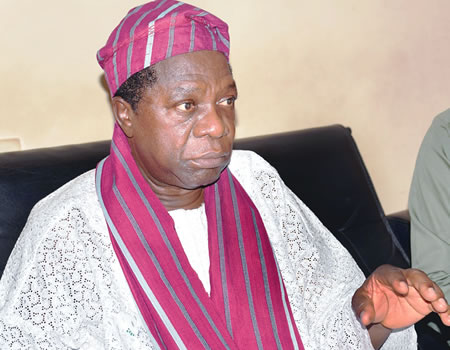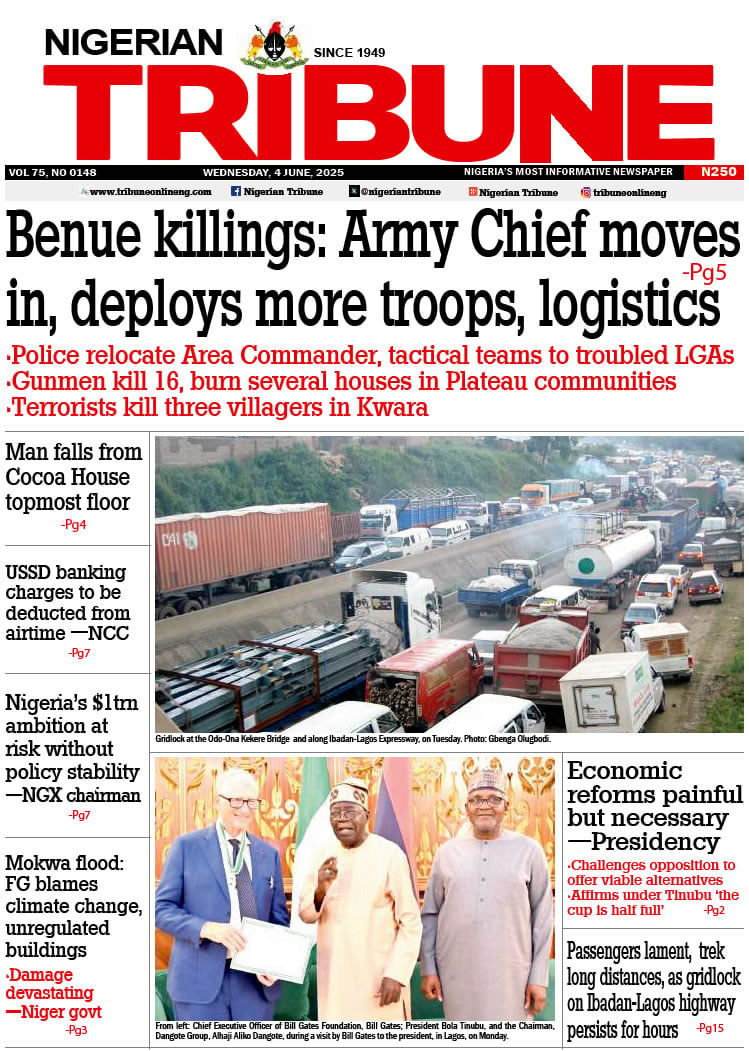LET’S share in your childhood memories.
I was born in a village in Ondo State called Olorunsefunmi. My father was a drummer. I followed him as an apprentice. My mother was an alternative medicine practitioner. So I grew within that space. I am a farmer too. I attended primary school in Ondo and later, Ondo Grammar School. I was in a boarding house and you know there was discipline in those days. You were not supposed to go out of the boarding school without exit permit. But we sneaked out at night to watch movies. In our own time, it was like magic. Sometimes we were caught and we received serious beating of our lives. Because of the level of my parentage in terms of money, I had to struggle to get my school fees. I was in form three when there was no money to continue in 1968. I am, however, grateful to Chief Obafemi Awolowo. If not for him, there could have been no me in terms of educational attainment in life. In 1955, he brought the policy of free education to the Western region. That was what brought me to primary school in 1956. One drama of note happened. My father said he was not going to train any female in school, because they would go and bear the husband’s name and drop the family name. But because I was going to school, my sister decided to follow me. When she got there, they checked if her hand touched her ear and it did. That was how she started school with me and became educated. In 1968, I worked at the rubber plantation that Chief Awolowo established at Araromi Odigbo. From there, I made money and continued in 1969. My mother planned to sell her dresses for me to go to school before the intervention of Awolowo, but thieves stole the dresses before she could do that. To make up, I had to break from school for one year. Today, I buy four papers everyday but my number one paper is Tribune. You know the reason? Awolowo made it possible for me to go to school. Two, I consider Tribune a gazette that papa left behind, which must not die.
How exciting were those days?
Very exciting. There was a popular hall in Ondo called St. Matthew then. We would go there to dance. But I could not do much of that because I was always on the farm with my parents. My colleagues made jest of me when we get back to school after the holiday when asked to write an essay on how we spent the holiday. While they would say we travelled to Lagos and so many other places, I would say I was in the farm planting cocoa. One looked inferior in quote, but hard work pays. I was not distracted by the jest. Today, I have things that make those friends jealous of me. I have hotels and they ask for discount when they come.
How did you manage to get higher education?
My parents, especially my mother, said then that: “Arinola, you have finished WASC. I don’t have money for unifafiti (university). I want to build house because my priority has always been to build house.” We had extended families that were well-to-do in Lagos. I didn’t go to them because of my republican nature. So, I stayed with a friend and from there, I managed to get a job at a chemist shop. From there, it was to a company where they produced batteries at Cappa. Then, Radio Nigeria. But I still wanted to acquire higher education studies. In 1973, I gained admission into Yaba College of Technology to study Mechanical Engineering. Tuition fee was N48, but I still couldn’t afford it until the admission lapsed. So when I got a job at British Petroleum, and later African Petroleum (now Forte Oil), the pay was fairly good, I sat again for Yaba College of Technology examination to study Electrical and Electronics Engineering and got admitted. When I got the admission with my position as a unionist, I also got the management to adopt a policy that staff could further their education. The policy passed and I benefitted from it. We did three shifts -morning, afternoon and night. I begged to be on permanent afternoon because it was a full time course so I could use the morning to go to school. I bought motorcycle to aid my movement, but I fell from it and got a mark. So I started going to school, working and practising unionism.
How then did you meet your wife?
We both worked at the British Petroleum. She was my type. She hates cheating. I hate people being oppressed. I have been beaten on behalf of another person in secondary school. Saw an elderly person beat someone, I joined him and he beat both of us together. She was very strict. I didn’t have money, but those richer than me were toasting her. She rejected them.
Was she not suspicious you were out for her?
She used to laugh at me after we got married. She said that if it were because of money, she wouldn’t have gone out with me. I remember the day I wanted to give her money for lunch and I gave her only 25 kobo. That was the first time she accepted to take the relationship seriously after two years. I wasn’t talking, but in my mind, I wanted her. The day she accepted the 25 kobo, was the day I knew she was considering me.
No flowers, love letters?
No. I don’t know how to do it.
Was she your first date?
No. My first date was much earlier. It was not a serious thing. My dating is not by talking, but by action. Going all over someone, and allow you to guess whether this person really wants me or not because to talk and say I love you, is very difficult.
Was there no law against couple working in same company then?
It was there. Immediately we got committed to the relationship, she had to leave. She sacrificed herself and she left. She was pregnant.
Is there anything she tried changing in you?
Yes. I was not as generous as her. Can you imagine giving 25 kobo to someone who had accepted you? It would have been good if it were one naira so that there would be surplus. Later in life when I began to see her life as more generous than myself, she was able to influence me to become generous.
Who did you take after?
My mother. She was hot. My father was a master in settling disputes. If someone wanted to commit suicide, and my father talked to the person, he would change his mind. So, he was cool-headed, but my mother was hot. In fact, my father used to tell us to do anything she wanted because my mother is the husband and he is the wife. But beneath that iron heart, she was a very kind woman.
What is it about unionists and women business?
It is true and I got involved. My wife always forgave me. You see, it’s not only unionists, but also journalists. Na only God go save you because most of the time you are out of your homes. Only 10 per cent can hold body if the truth is to be told. About 90 percent would look another way (philander).
What about your “Alari” and white fabrics fashion?
I started being like this seven and half years back and the reason is this, I went to Abuja to make law for good governance and to promote the culture of my people. It is an Ondo man that dresses like this for wedding and other related purposes. When I got to the House of Representatives and began dressing like this, people would say, are you from Benue State?
Is there something that gives you joy apart from money?
When I help people to achieve their aims in life, it gives me joy. I don’t have friends, but people follow me as if their lives depend on me. People are now seeing me as someone who is happy when they are happy. For example, in my oil business, I gave my senior driver one tanker. I gave the manager one tanker, my supervisor also. They put the tankers under my company and sometimes their own tanker will do more work than my own tankers, and yet I am the one signing their cheques. I see the cheques and I don’t get angry because their loyalty to me is absolute. Two, there are some of my boys that are richer than me till today. Funny enough, they were part of the drivers abusing me when I was trying to organise them in 1983. They called me all sort of names, but I told them that I had only come to ask of unity from them. I told them unity was the solution to all their problems.
Despite your being careful with money, you must have an indulgence.
I don’t. One thing I know is that if a car of mine is spoilt, I have the money to buy another one. I don’t indulge in drinking. Once I take a bottle, I am okay. My thinking is that if I drink too much and I feel tipsy and as a leader even if I am talking sense, they will think I am being influenced by alcohol. The same policy applies in my house too.
What has unionism done for you?
It has exposed me world over. It made me go to a University in Australia. It made me go to Soviet Union and so many other places. I was guest of Gadaffi. You know anything Left that time, Gadaffi would sponsor it.
So Gadaffi was sponsoring unionists?
Yes. Not only in Nigeria, but all over Africa. Tripoli is the African oil union headquarters. Gadaffi was bankrolling trade union in Africa. Nigeria will not bankroll anything. He was trying to revolutionize African people, but we, Nigerians, have our pride.
What did you take away from your interaction with him?
Gadaffi was a patriot to his people. The country is bigger than Nigeria in size, but their population was just 45 million. There was no student in the university then without a car or house. His people trusted him, but America did not like what the man was doing. They employed propaganda outside, whereas his people were enjoying life. They had electricity, water and they were not paying for anything. So we took patriotism from him over there. But American propaganda cannot be fought.
Tell us some myths about him?
He used female bodyguards and they were tough ladies.
Is there an unforgettable moment in your life looking back?
Something unforgettable is the beating that I have received from police, army and so many others. I tell you that they had to operate on these eyes after being hit with guns during the June 12 struggle. Beyond the June 12 struggle, when I also started working against casualisation in the oil industry. If the oil industry does not employ people, is it the textile industry that will employ them? If you are making that kind of money from this country, you must employ these people, not on contract basis, but on full time. At that time, there was this coinage that the fear of Akinlaja is the beginning of wisdom in casualisation of workers’ matter. This is because I would carry tankers to go and block them at Chevron in Lekki and occupy the whole of Epe.
And your wife did not stop you?
Whenever security agents attacked me, she would be there in less than an hour, shouting where is my husband? I said she was unionist in nature. She was made in heaven for me. When I went to occupy Chevron, there were 25 operation vans and 911, waiting for me with security agencies. I used to carry tankers to block places without knowing they were prepared for me on this occasion. My wife would make puff-puff and other snacks so that by 4.00 a.m., it would be ready and we would move by 5.00 a.m. But this time, we got to Chevron in Lekki and police were waiting for us. They beat me and one police officer corked gun to shoot me. I dared him to shoot. Then, I was attacked from behind, fell down and thrown into vehicle. News went round police had killed Akinlaja and all tanker drivers moved and blocked everywhere. Security signal got to Abuja and questions were asked everywhere. It was a tough situation, but we were able to achieve our aims that casualisation of workers in the oil industry should be stopped.







